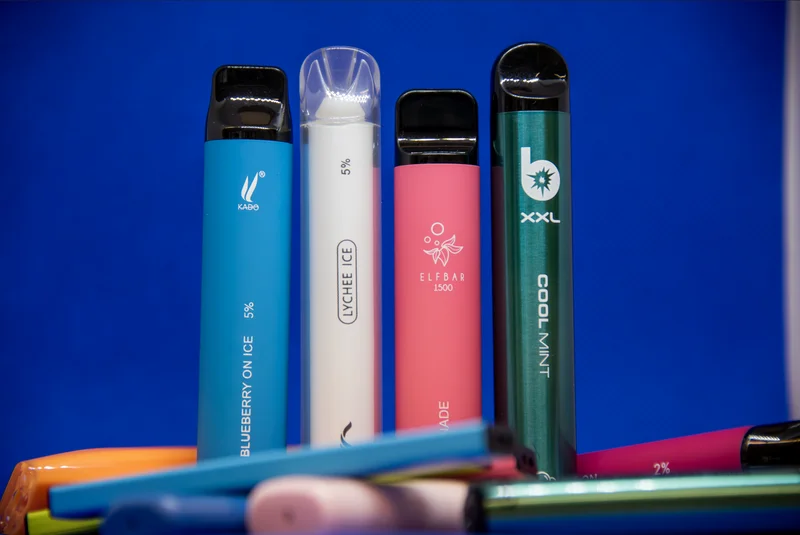- 24.07.2023
- News
Flavour ban effective in reducing e-cigarette consumption among young people
According to a study recently published in the Journal of Studies on Alcohol and Drugs, a total ban on flavours (or limiting them to two "standard" flavours, mint and tobacco) could encourage teens and young adults who smoke electronic cigarettes to stop using them. A ban on flavours, including mint, would significantly reinforce this decline. Unfortunately the Council of States in Switzerland recently rejected such a ban.

Disposable e-cigarettes in different flavours (Photo: AT Switzerland)
The study was based on a national sample of 1,414 young Americans aged 14 to 21, who reported having used electronic cigarettes in the past 30 days. In particular, these adolescents and young people were asked to indicate the age of their initiation to electronic cigarettes, their flavour preferences, and the type of electronic cigarette they preferred. They were also asked whether they would continue to use electronic cigarettes if flavours were banned, with the exception of tobacco and menthol flavours, or only tobacco flavour.
More than two-thirds of young people likely to stop using e-cigarettes if flavours are banned
According to the study, the average age of initiation to electronic cigarettes is 16. In 45.3% of cases, fruity flavours were named as the flavours preferred by adolescents and young adults, followed by iced fruit flavours (30.5%), fresh mint (10.7%), menthol (10.2%), and tobacco (3.3%). The survey also reveals high penetration of disposable electronic cigarettes among adolescents and young adults, with 47% of respondents indicating that this was their preferred device. Finally, 38.8% of adolescents and young adults indicated that they would stop using electronic cigarettes if flavours, with the exception of menthol and tobacco, were banned. The extension of this ban to the menthol flavour would considerably strengthen the effectiveness of the measure, since 70.8% of respondents indicated that they would stop using electronic cigarettes in this case.
A public health measure increasingly considered
Among the main limitations of the study, the researchers note that almost 80% of the respondents were women, and that the majority of them were white, which could hinder the generalisation of these results. especially as menthol consumption in the United States varies widely according to the ethnicity of individuals. However, these results seem to indicate that a ban on flavours, with the exception of tobacco flavour, could have a significant impact on the consumption of electronic cigarettes among younger generations. This measure has already been implemented in several countries such as Finland, Hungary, Denmark, Lithuania, the Netherlands, and Ukraine.
Unfortunately, Switzerland is lagging behind in the fight against electronic cigarette use among children and adolescents: in May 2023, the Council of States rejected a motion by National Council member Benjamin Roduit (Valais) taking the country in this direction.
Study:
Adolescent and Young Adult Response to Hypothetical E-Liquid Flavor Restrictions, Natasha K. Sidhu, William V. Lechner, Sam N. Cwalina, Lauren Whitted, Sabrina L. Smiley, Jessica L. Barrington-Trimis, Junhan Cho, Theodore L. Wagener, Adam M. Leventhal, and Alayna P. Tackett, Journal of Studies on Alcohol and Drugs, 2023 84:2, 303-308